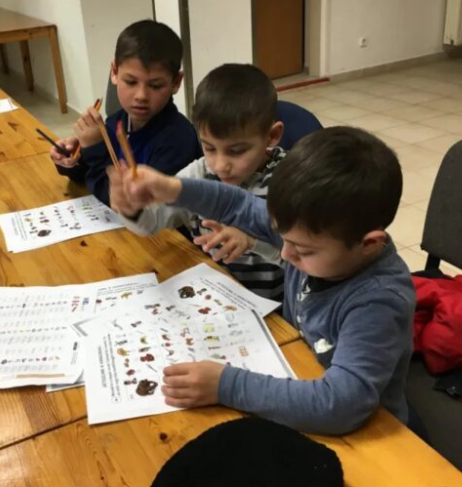As the 2021/2022 school year comes to an end, the last letters of the word ‘holiday’ are written on the board. However, some students are also counting these last days in an other way: these children arrived with their parents and relatives from Ukraine and have been living here during the 112 days of the Russian-Ukrainian war.
Hungarian catholic institutions all over the country took in children of families fleeing the war, who joined a school or kindergarten community for a longer or shorter period of time. In addition to participating in educational activities, they were also involved in the life of the institution, and the school community, together with Caritas Hungary, often helped to meet other needs of the families, such as housing and clothing. Many of the new arrivals have also started the citizenship application process, as reported by the Greek-Catholic kindergarten in Nyíregyháza. Cooperation started in every community, from small villages to schools in the capital.
Students’ lives and their time at school were of course determined by their family’s plans. For many, Hungary was just a stopover, with relatives and acquaintances working in the Balkans or in Western countries being the final destination, so pupils got involved in school activities to various degrees, especially in the eastern and southern border regions. For example, the dormitory of the Szignum Bilingual Ecclesiastical Primary School in Makó provided accommodation for only one night for many refugee families, many of whom experienced the fury of war first hand.
In line with the call of Pope Francis, the bishops of Hungarian dioceses also promoted praying for peace, and Catholic institutions joined the initiative, so that every student could do something for his or her peers every day. However much time the children from Ukraine spent in the school, they were welcomed with excitement and love by the Hungarian pupils. The classrooms seemed larger, with room for an extra table everywhere. This was also reported by Ramon Espasa-Sancho, the principal of the József Mindszenty Catholic Primary School in Esztergom:
"...in the morning, two siblings (who had arrived from Transcarpathia over the weekend) joined the Mindszenty School. The fourth class welcomed them with sparkling eyes, as they had prayed really hard for peace in the last days. The third sibling turned out to be a kindergartener. We do our best to make them feel at home as much as possible under the circumstances."
In many places, children who had also attended Hungarian schools in Ukraine sought out Catholic schools.
“There is no language barrier, because the pupil, who is a dual citizen with Hungarian mother tongue, went to a Hungarian school,” said Erika Turzáné Papp, the principal of the Saint Margaret Secondary School and Primary School in Tatabánya about a fifth-grader from Beregszász (Berehove). “This pupil needed very little help from our teachers to get up to speed with other students. Friendships were formed and they are having a good time. The family has been taken in by the family of the Reformed pastor, who provides them with accommodation, and the parents have found work.”
Of course, Ukrainian-speaking pupils also attended the classes, and caring for them required more organisation and support. There is also a Ukrainian-speaking boy at the Blessed Virgin of Fatima Elementary School in Alsószentiván. He does not speak Hungarian, but had been living with Hungarians, so he understands the language, which made the integration process easier for him.
In addition to the Ukrainian-speaking teachers, helpful Ukrainian-speaking parents, Russian teachers and Ukrainian citizens working in the school’s neighbourhood helped interpretation, learning basic language skills and participation in different activities. Bernadett Tóthné Molnár, principal of the Saint Anne Catholic Primary School and Kindergarten in Szany, said that they managed to find Ukrainian-speaking teachers who teach the students with the help of first-grade textbooks and Ukrainian-Hungarian language books. The opportunity to help means a lot to all of them, and the helpers have been enriched by this as well.
Language barriers were overcome not only in the classroom, the universal language of sport, football, also helped. The Zoltán Meszlényi Catholic Primary School in Esztergom has put together a team of Ukrainian pupils for the second diocesan football tournament of the Archdiocese of Esztergom-Budapest.
 Pupils learning at the Saint Lawrence Catholic Primary School in Budapest
Pupils learning at the Saint Lawrence Catholic Primary School in Budapest“The children are having a good time, there is no sign of trauma, and they have said that despite lagging behind, they finally enjoy school; a normal pace of life is a remedy for them" – said Gergely László Berthóty, principal of the Saint Anthony of Padua Primary and Secondary School in Piliscsaba. They have contacted the school in Ukraine, as “... to get a Ukrainian certificate for their studies they must meet Ukrainian requirements as well (e.g. relating to Ukrainian language studies) – so they also study online.”
Of course, a school psychologist is present in every school, and if children have been traumatised by fear and the experience of war, child protection and other professionals are involved to help them process the trauma.
Schools opened their doors not only to pupils, teachers’ selfless help extended to their colleagues as well: “We accommodated two Hungarian music teachers from Transcarpathia in a guest house in Óbuda. The fee of the accommodation is paid by the community of colleagues for the whole duration of their stay” – wrote Lászlóné Mészáros, principal of the Leó Weiner Catholic Secondary School of Music and Arts.
A school year is over, but inclusive love cannot rest in the summer. A new cooperation, this time with the donations of families, Catholic communities and teachers, will help the children move on, so that the remedy, a normal pace of life, can give direction to their lives.
Budapest, 16 June 2022
